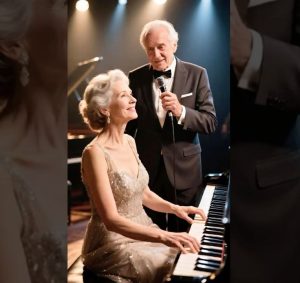Few songs in modern music carry the emotional depth, vulnerability, and haunting beauty that Elton John’s “Sacrifice” does. Released in 1989, at a time when pop music was often driven by synthesizers and upbeat rhythms, Sacrifice stood apart a slow-burning, soul-stirring masterpiece that spoke not about passion or heartbreak in the usual sense, but about the quiet collapse of love and the endurance of emotional truth.

The Birth of a Ballad
The late 1980s marked a mature period in Elton John’s musical journey. Teaming once again with his longtime lyricist Bernie Taupin, Elton was exploring themes far beyond youthful romance or rock exuberance. Together, they crafted Sacrifice a ballad that stripped love down to its raw essence.
The song appeared on the album “Sleeping with the Past” (1989), a record heavily influenced by the soul and R&B sounds of the 1960s, which both men had grown up with. But Sacrifice wasn’t about nostalgia; it was about introspection.
Elton’s Voice: Soft Power and Sincerity
Elton John’s voice in Sacrifice is unlike his earlier flamboyant performances. Gone are the soaring crescendos of “Rocket Man” or the exuberance of “Crocodile Rock.” Here, he sings with restraint, almost a whisper at times, allowing every syllable to breathe.
There’s a wisdom in his tone, a weariness that feels both lived and shared. He doesn’t beg or plead. Instead, he accepts. The melody moves with patience, built on a foundation of soft synth chords and a tender drum rhythm that gives space to his voice and the silence around it.
A Video That Told a Story
When the song was released, its music video added even more emotional depth. Directed by Alek Keshishian, it tells the story of a couple whose marriage is crumbling not through dramatic fights, but through distance, misunderstanding, and silence.
The video’s muted tones and simple storytelling perfectly match the song’s honesty. The most heartbreaking moments aren’t loud or violent; they’re the quiet ones a glance unreturned, a dinner eaten in silence, a hand no longer held.
A Late-Blooming Classic
When Sacrifice was first released in 1989, it wasn’t an immediate hit. It reached only modest chart positions. But then something remarkable happened radio DJs began to replay it, sensing its quiet power.
By 1990, the song had found new life in the UK and Europe, eventually becoming Elton John’s first solo number-one single in the United Kingdom.
It was a rare triumph: a deeply introspective, melancholic song topping pop charts during a decade known for its flash and excess. The public had found something timeless in its simplicity.
A Song That Lives Forever
There’s a moment near the end of Sacrifice when Elton’s voice fades, and the music lingers soft, almost ghostlike. It’s as if he’s not ending the song, but leaving it open, unresolved, like life itself.
That’s what makes it timeless.
Every generation discovers it anew, hearing something different each time pain, peace, acceptance, or nostalgia.
And when the final note fades, you’re left not with sorrow, but with reflection the quiet realization that love, even when it ends, is never truly wasted.



